Hospital armed siege turned me from BBC reporter to negotiator
- Published
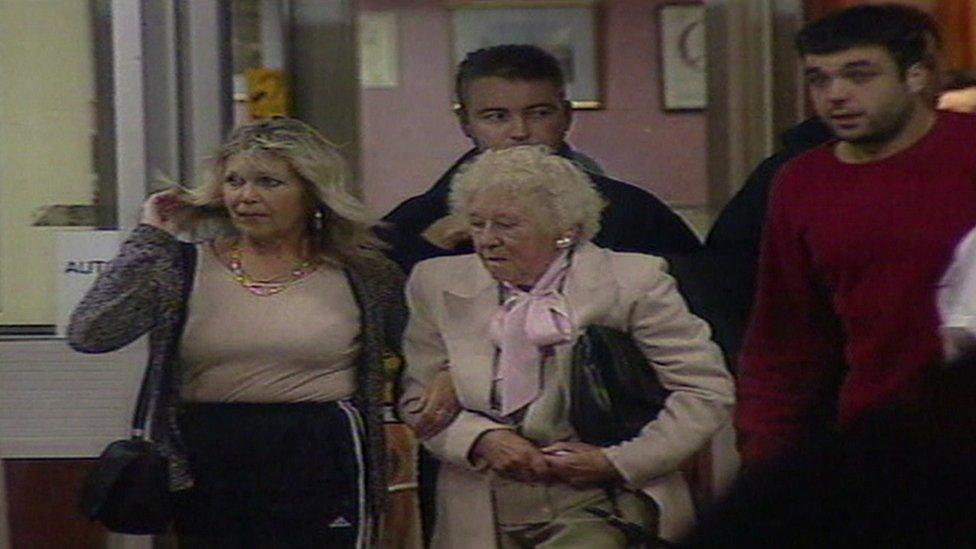
Half of the more than 300 patients were evacuated from the hospital for the 48-hour siege
When I was handed a telephone to the gunman, all I knew was a doctor had been taken hostage and the gunman was threatening to burn the hospital down.
I'd had no real briefing when police gave me the phone to speak with David Collins, but I knew this was critical.
Half of the hospital, filled with 300 patients, was evacuated as the Army and 100 police officers descended.
But negotiating with a gunman was not what I expected after arriving to cover the siege as the local BBC reporter.
It was a late evening back in October 1999 and as I was the radio journalist who covered west Wales, I headed for Haverfordwest near the very western tip of south Wales as soon as I got word of a possible siege.
I'd been waiting outside Withybush Hospital for a few hours when I was asked to take a call from the police officer in charge of the operation.
I was thrilled as I wanted to find out exactly what was going on inside but I didn't expect what Dyfed-Powys Police Supt John Daniels had in mind for me.
He wanted me to speak to the hostage-taker.
David Collins, who was 38 at the time, wanted to take revenge on the hospital to show how badly he felt he had been treated by them.
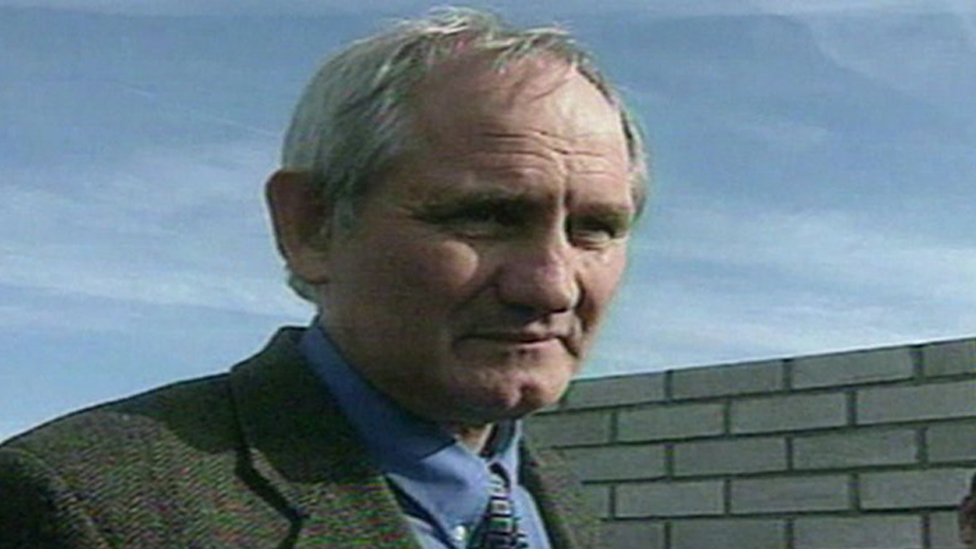
I had to explain to my press colleagues where I went and give them some sort of insight into what went on inside the hospital
He was an alcoholic and claimed that, in the spring of 1999, he was told by a specialist at Withybush that his addiction would kill him.
So he built up thousands of pounds of debt thinking he'd never have to pay it back.
But in a further consultation later in the year, after asking the specialist "when am I going to die?", the doctor's reply was "you're not going to die - but your risk of death will increase if you continuing drinking heavily".
When hearing he wasn't facing imminent death, he felt very upset and wanted revenge.
Collins returned to Withybush and grabbed any old doctor - it just happened to be 28-year-old junior doctor Kingsley Paul - took him hostage, tied him to a seat and held him at gunpoint.
He also told emergency services that he'd filled balloons with petrol and if anyone broke into the room, he'd set them alight.
So, not really knowing what I was walking into, I was escorted to the basement of the hospital where Supt Daniels just asked: "Gil, I was wondering could you please give us a helping hand and chat to this bloke and see what you can do?"
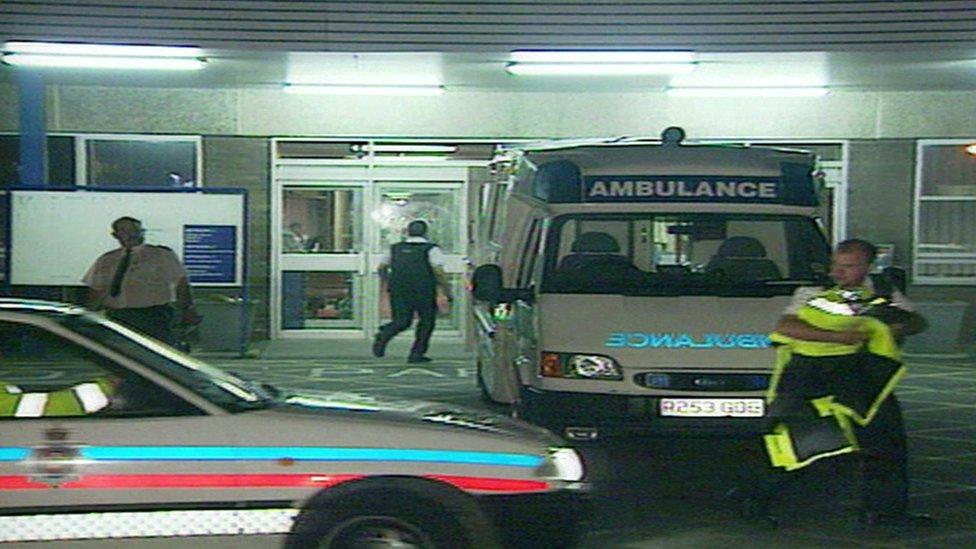
There were police everywhere as the siege went on for about two whole days
"Of course," was my reply. Although my request to record the conversation for radio was politely declined.
I was quickly ushered up two or three flights of stairs, into a side door, past lots of armed officers and into an clerical office just down the corridor from where the siege was happening.
The room had two experienced negotiators, a telephone and "isn't it time we called it a day?" written on a blackboard - oh, and me.
As I sat down, the telephone was placed in my hand and as quick as that I was calling the gunman.
I was amazed how fast it happened, it felt like a few minutes. There was no preliminary briefing - just the plea "chat to him Gil". It was as simple as that.
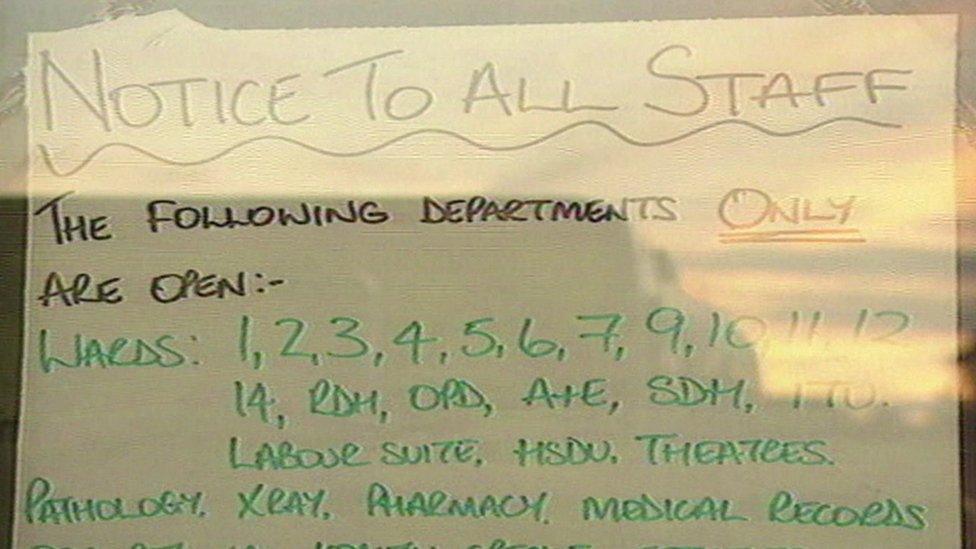
Much of the hospital was able to still operate despite the ongoing siege upstairs
I mean, what do you say to a man who is holding a gun to the head of a doctor a few rooms away?
So I went into journalist mode and started asking him about his life.
I started by saying hello and asking "have you heard of me?"
He replied "no", which was a blow to my ego!
We chatted about his family, kids, friends, his job and where he lived - occasionally mentioning "isn't it time we called it a day?" as requested.
He was an unemployed scaffolder and as I was having work done on my house, we had this surreal conversation about types of scaffolding as I'd had it up on my house.
I tried not to think about the possible consequences as that would've been too much pressure so I just chatted.
There was one frightening moment when he just stopped talking, it went silent and the line went dead.
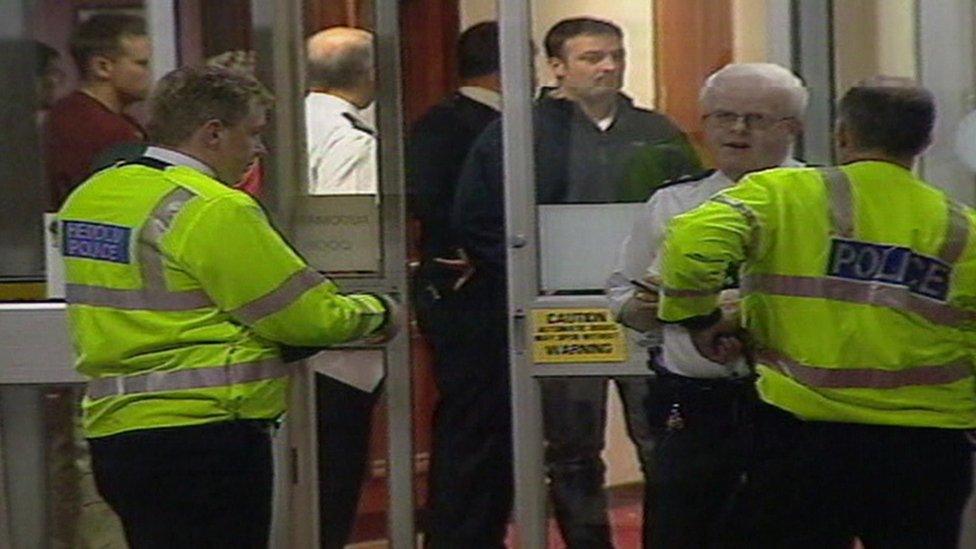
Emergency services were everywhere as they took the hostage's threat extremely seriously
I thought: "Oh no, what did I say? Is he going to kill that doctor and is this place going to blow up any minute?"
I held my breath, we all held our breath but nothing happened so I dialled back up and continued our chat.
After about four hours of talking, he broke down in tears and confided "I've really got myself in a mess and I don't know what to do".
He explained to me his situation and was clearly unwell.
I tried to sound as sympathetic as I could without suggesting what he was doing was right. It was so tense, my stomach muscles were so tight, I was in pain for days afterwards because of the tension.
The hospital cancelled 68 operations and 700 outpatient appointments, while 150 patients were removed during an evacuation of the hospital, but I was later told we were directly below the intensive care unit.
So while they'd emptied the rest of the hospital, they couldn't move the people on life support above us.
I talked to him for more than four hours but the siege went on for 48 hours in total - although Collins did finally release Dr Paul after 28 hours.
I remained in the hospital at the police's request in case they needed me again.
I even did live radio broadcasts from inside but I just couldn't divulge my secret assignment in the operation.
I'm often asked why Supt Daniels chose me. I don't know, but we did know each other from previous cases and maybe he knew me better than the other journalists present.
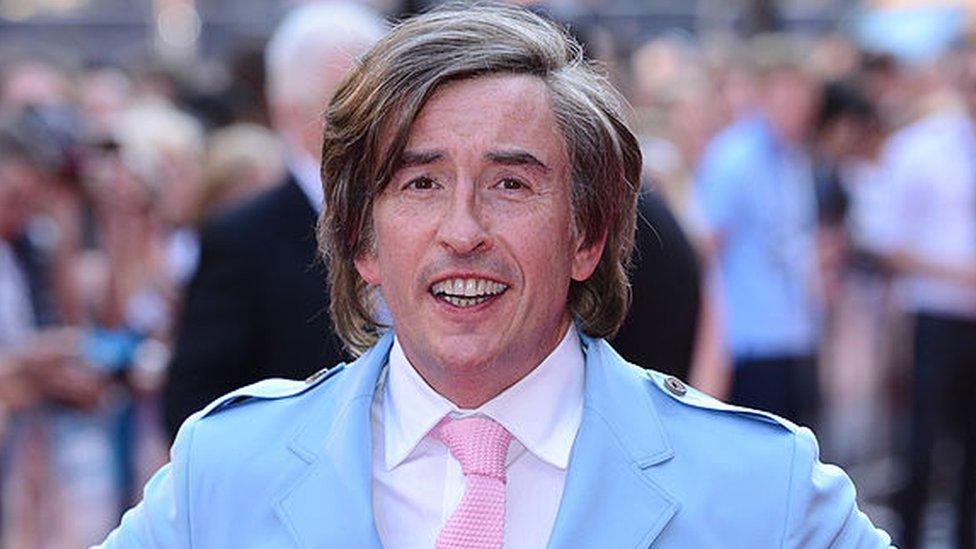
Some colleagues insist the Steve Coogan's 2013 comedy film Alpha Papa is inspired by my story but I don't know if that's true
Some colleagues reckon I was chosen because they say I have a distinctive, low-pitched, reassuring-sounding voice.
Friends joke and call me "whispering Gil" and think my voice is quite soothing, I couldn't possibly comment - but I was never told why police chose me and I never asked.
Some people have also said to me that my story inspired Steve Coogan's 2013 film Alpha Papa but, again, I'm not so sure.
Collins was eventually talked out after 48 hours and it turned out the gun he claimed he had was a fake and the balloons were filled with water.
He was later jailed for life after admitting to false imprisonment, possessing an imitation firearm with intent and threatening to destroy property.
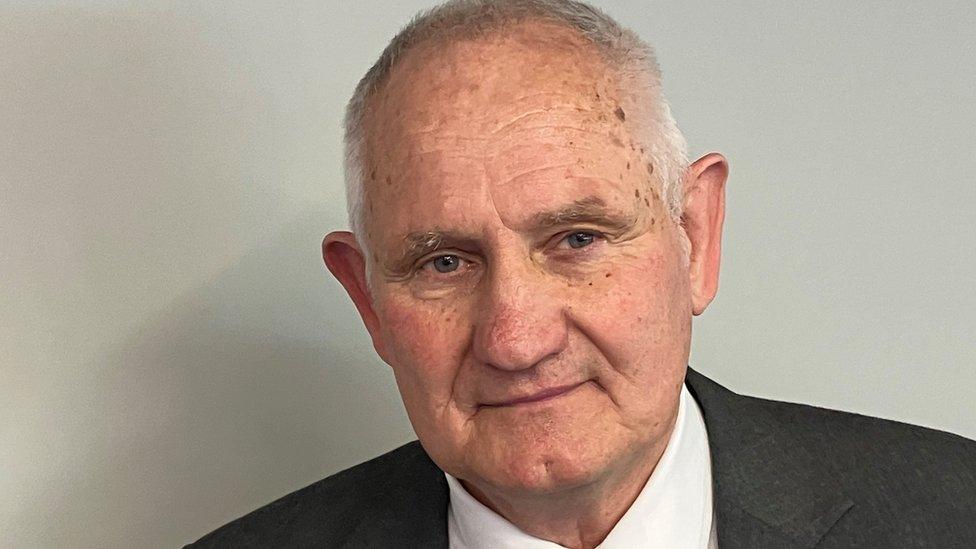
I've lived and loved my days reporting for the BBC over 50 years from west Wales
Two years after he was jailed at Swansea Crown Court, I had a call from a prison - it was Collins.
I was very taken aback but he wanted me to help him do a TV programme about him and the hospital siege but I passed on his offer.
Supt Daniels later told me later he had taken the siege recordings to a crime-fighting conference in the United States as, at that stage, a journalist hadn't previously helped negotiate in a hostage situation before.
I must say, I would've welcomed a free holiday to the USA. But, nevertheless, I was rather very grateful to receive a commendation from the chief constable for my work in the siege.
I was just glad to have helped and ultimately no-one was hurt.
I'm now 80 and will retire this summer after 50 years at the BBC where I covered cases including the Clydach Murders, Llandarcy Murders and the Withybush siege.
I found them very emotional stories to cover and often still get dreams about that hostage situation at Withybush.
Things like that do tend to stay with you for life.